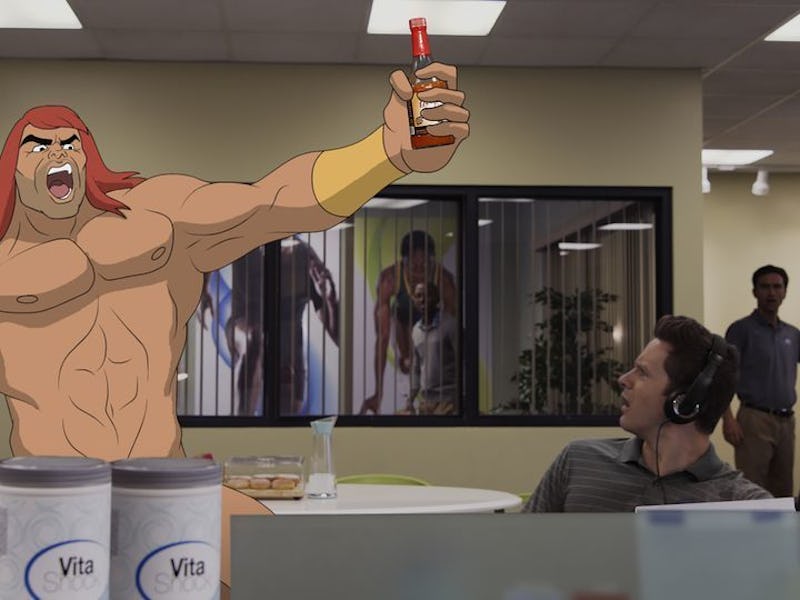Can a TV Show Teach Our Kids Zephyrian Values?
The biggest problem with 'Son of Zorn' is its ludicrous main character's refusal to get out of the spotlight.

Like the half-Zephyrian high schooler Alangulon, Son of Zorn is torn between two identities. The series wants to parody normative sitcom gender roles and poke fun at a macho white dude fighting for relevance in a world that doesn’t need or want his bullshit. It also wants to be a genuinely emotional show, to hit some of the same chords as a traditional half-hour comedy. To that end, Son of Zorn attempts to tell simple stories about simple truths. Unfortunately, these lessons don’t land because the show can’t help but undermine itself.
“The War of the Workplace,” the show’s third episode, has all the right ingredients. There’s a clear thematic throughline between its two plots. Alan is getting bullied at school (by someone who looks not at all like a high school teen, which feels like a clever joke no one bothered to punch up) at least in part because he’s half-Zephyrian. Over at his office, Zorn’s missing the violence and turmoil of his previous life, so he turns a simple workplace conflict into a life-or-death battle. Both storylines are about fighting, and they intersect in a pretty straightforward way: Edie explains to Zorn that she doesn’t want him teaching their son to fight and Zorn insists he doesn’t fight anymore … while secretly waging war on a hot sauce thief in his office building. But, beyond that, Son of Zorn doesn’t dig any deeper. The humor comes from Zorn being a hypocrite and a liar; it isn’t earned through revelation.
That’s too bad because there’s a much more compelling idea at play here. Alan struggles to face a bully at school, but his own father is a bully. Surely there’s a connection? But instead of talking about generational changes within families and cultures, the show goes on a weird tangent about Edie’s past experience with bullying. The jokes about Edie being a former bully are funny but they’re only funny. They don’t develop the characters or really teach them anything at all. Edie admits that violence gives her a rush, but none of this is new information. In fact, the only thing we do know about her is that she used to have a wild side when she was with Zorn and that she’s trying to keep a handle on it now that she’s with Craig.
She’s a warrior-turned-housewife, and Son of Zorn has yet to dissect the gendered tropes that involves. Does she work? Did she ever? Does she know anyone other than Craig, Zorn, and her son? Cheryl Hines previously played the seemingly vapid housewife Dallas on ABC’s Suburgatory, an initially shallow character who turned out to be unexpectedly complex. Hines is certainly talented enough to infuse Edie with depth and humanity, so it’s clear that there’s a choice being made here. And it’s impossible to convincingly mock sitcom shallowness while making that sort of decision.
The show has cleverly created a character capable of leading its less introspective players toward meaning, but it’s unclear if the writers are interested in Craig either. Only in the final seconds of the episode, when he says “Zorn, you are loved,” is there any hint at the power of his emotional availability. Son of Zorn would rather dwell on its main character’s idiocy than engage with it or try to solve the problem. Sure, Zorn turning the commonplace drama of a guy from the neighboring office stealing hot sauce into a war is a funny premise, but there’s not much of a payoff. We don’t learn about war or office culture. We just get a weak Pokémon joke because every comedy this fall is required to make a Pokémon joke.
Eventually, Alan defeats his bully by kicking him with his super-strong legs. Sure, it’s an accident, but he wins by channeling his father. The show wants so badly to circle back to Zorn, which is the problem. Zorn just takes up too much space in the world he occupies. The show can’t make progress because the caricature at its heart refuses to budge. Its an accurate but frustrating simulacrum of popular culture.